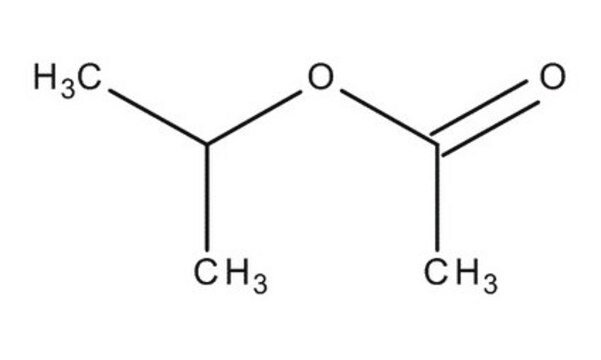W292605
Isopropyl acetate
≥99%, FCC
Synonym(s):
Acetic acid isopropyl ester
About This Item
Recommended Products
biological source
synthetic
Quality Level
grade
Fragrance grade
Halal
Kosher
Agency
follows IFRA guidelines
meets purity specifications of JECFA
reg. compliance
EU Regulation 1223/2009
FCC
FDA 21 CFR 172.515
vapor density
3.5 (vs air)
vapor pressure
47 mmHg ( 20 °C)
Assay
≥99%
form
liquid
autoignition temp.
894 °F
expl. lim.
1.8 %, 37 °F
8 %
refractive index
n20/D 1.377 (lit.)
bp
85-91 °C (lit.)
mp
−73 °C (lit.)
density
0.872 g/mL at 25 °C (lit.)
application(s)
flavors and fragrances
Documentation
see Safety & Documentation for available documents
food allergen
no known allergens
fragrance allergen
no known allergens
Organoleptic
banana; ethereal; fruity; sweet
SMILES string
CC(C)OC(C)=O
InChI
1S/C5H10O2/c1-4(2)7-5(3)6/h4H,1-3H3
InChI key
JMMWKPVZQRWMSS-UHFFFAOYSA-N
Looking for similar products? Visit Product Comparison Guide
Application
- Comparative Study on the H-Abstraction Reactions of Isopropyl Acetate and Propyl Acetate by HO(2) and OH Radicals.: This research explores the reactivity of isopropyl acetate with radicals, crucial for understanding its stability and degradation in atmospheric conditions, offering insights relevant to environmental chemistry (Gao et al., 2024).
- Diastereoselective and Scalable Synthesis of 6-(S)-Hydroxycannabidivarin.: This study includes methods where isopropyl acetate is used in the synthesis of cannabinoids, demonstrating its utility in enhancing reaction conditions for pharmaceutical applications (Stone et al., 2023).
- Volatile Dual-Solvent Assisted Intermediate Phase Regulation for Anti-Solvent-Free Perovskite Photovoltaics.: Discusses the use of isopropyl acetate in producing advanced materials for solar cells, emphasizing its role in optimizing fabrication processes and enhancing the efficiency of renewable energy technologies (Yang et al., 2023).
Disclaimer
Signal Word
Danger
Hazard Statements
Precautionary Statements
Hazard Classifications
Eye Irrit. 2 - Flam. Liq. 2 - STOT SE 3
Target Organs
Central nervous system
Supplementary Hazards
Storage Class Code
3 - Flammable liquids
WGK
WGK 1
Flash Point(F)
41.0 °F - closed cup
Flash Point(C)
5 °C - closed cup
Personal Protective Equipment
Certificates of Analysis (COA)
Search for Certificates of Analysis (COA) by entering the products Lot/Batch Number. Lot and Batch Numbers can be found on a product’s label following the words ‘Lot’ or ‘Batch’.
Already Own This Product?
Find documentation for the products that you have recently purchased in the Document Library.
Customers Also Viewed
Our team of scientists has experience in all areas of research including Life Science, Material Science, Chemical Synthesis, Chromatography, Analytical and many others.
Contact Technical Service













